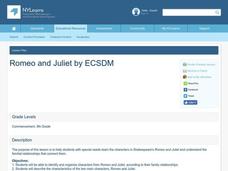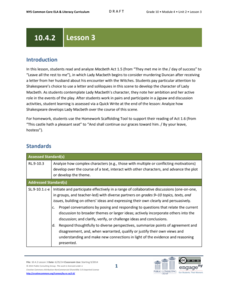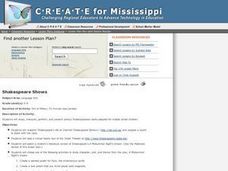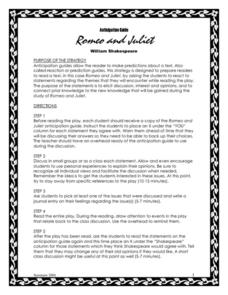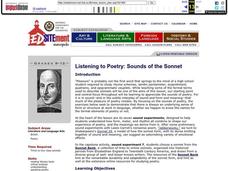Curated OER
Romeo and Juliet
Use this SMART board activity to review the familial relationships in Romeo and Juliet. Review the characters from the play using descriptions first, then in the context of the other characters. The SMART board file (included) guides...
EngageNY
Mid-Unit Assessment: Analyzing an Author’s Argument and Text Structure
William Shakespeare: a writer, a poet, a fake? For their mid-unit assessments, scholars read an excerpt from the article "The Top Ten Reasons Shakespeare Did Not Write Shakespeare" by Keir Cutler. Next, they analyze the author's argument...
EngageNY
Grade 10 ELA Module 4: Unit 2, Lesson 3
How does Lady Macbeth's ambition help advance the plot of Shakespeare's Macbeth? Scholars explore the topic using discussion and a jigsaw activity. Next, they complete a quick write to analyze how Shakespeare develops Lady Macbeth's...
EngageNY
Grade 10 ELA Module 4, Unit 2, Lesson 25
How do film adaptations differ from their literary counterparts? Scholars watch and analyze the 2011 Royal Shakespeare Company (RSC) production of Shakespeare's Macbeth. Pupils complete a Quick Write analyzing how the RSC production...
EngageNY
Grade 10 ELA Module 4: Unit 2, Lesson 18
Macbeth describes life as a light and a candle, suggesting it is fleeting and meaningless. Using the resource, scholars engage in an evidence-based discussion and complete a Quick Write about Shakespeare's use of figurative language in...
EngageNY
Grade 11 ELA Module 1: Unit 2, Lesson 18
How does the comparison of Hamlet to Fortinbras develop Hamlet's character? Scholars complete a Quick Write to answer the question. They also continue their exploration of Shakespeare's Hamlet, reading and discussing Act 4.4.
EngageNY
Grade 10 ELA Module 4: Unit 3, Lesson 5
Would Machiavelli consider Macbeth a successful ruler? Scholars ponder the intriguing question, demonstrating their knowledge of Shakespeare's Macbeth and Machiavelli's The Prince. They collaborate with peers to share their opinions,...
EngageNY
End of Unit 2 Assessment, Part 2: Revise Essay Drafts
Time to revise! Scholars revise their argument essays based on Shakespeare's A Midsummer Night's Dream using feedback from their teacher and peers. They begin their revisions after reviewing a mini-lesson plan on proper writing conventions.
K20 LEARN
That Which We Call a Rose: Connotation and Denotation in Romeo and Juliet
Words carry weight. And some words carry baggage. Scholars learn the difference in a study of connotation and denotation. Individuals sort the cards into three groupings using words from Shakespeare's play. After sharing within groups,...
Curated OER
Shakespeare Shows
Students study, interpret, perform, and present various Shakespearean works adapted for middle school Students. They choose a scene from one of the plays covered in this teaching unit to reenact with a group.
Curated OER
Macbeth: Shakespeare for Elementary Students (Elementary, Literature)
Students act out a fully realized Shakespearean play designed to be utilized by mid level elementary students.
Curated OER
Shakespeare Wall
Learners create a visual notebook of a Shakespearean play by taking the actual written work, hanging it up on the wall, and highlighting various literary aspects of the play as they unfold.
Novelinks
Romeo and Juliet: Anticipation Guide
To prepare readers for some of the themes in Shakespeare's Romeo and Juliet, individuals complete an anticipation guide and then share their ideas in small groups.
Curated OER
Shakespeare: Performance First
This lesson invites students to interact with the play from their first encounter, determine actions implied from the text and better comprehend Shakespeare's language.
Curated OER
History According to Shakespeare
Students read Shakespeare's, Julius Caesar while identifying a number of literary elements including simile, metaphor, personification, and hyperbole. As a response activity, they simulate a mock trial, and finally, compare and contrast...
Curated OER
Character in a Box
Partners choose, research, and analyze fictional or historical characters and design character life boxes to represent them. They also compose a rhyme royal, which they understand inductively by deconstructing examples. Based largely on...
Southern Nevada Regional Professional Development Program
Reading Literature - Romeo and Juliet
“What is the theme of this story?” Now there’s a question all pupils dread. Rather than encountering a sea of faces that look like they were painted by Edward Munch, face a classroom filled with smiles and confidence. Show your readers...
Curated OER
Much Ado About Something (Lesson 2)
Students view more video clips of Shakespeare's plays. They answer comprehension questions over the video. They are introduced to the language Shakespeare used as well.
Curated OER
Much Ado About Something (Lesson 4)
Students view a film about Shakespeare and his poetry. They complete a worksheet while viewing. They discuss how to properly read a poem and practice reading his sonnets.
Curated OER
To Freeze or Not to Freeze
Students examine the non-verbal elements of a theatrical performance. They read an article, answer discussion questions, conduct Internet research, and stage frozen tableaux based on lines from Shakespeare's works.
Curated OER
A New Look at Romeo and Juliet
Learners explore life and language development in the Elizabethan Age. In this English lesson students complete web-quests and other activities surrounding Shakespeare's Romeo and Juliet.
Curated OER
Illuminating Our Human Experiences: Soliloquy from Hamlet
Students determine the meaning of a soliloquy and examine the themes in Shakespeare's, Hamlet. In this literature lesson, students read Hamlet's soliloquy and watch a Photo Story 3 text model of such. They write a personal soliloquy...
Curated OER
Crafting a Character - The Making of Shylock
Students, in groups, analyze the characterization of Shakespeare's Shylock from "Merchant of Venice". They examine text, view movies and interpretative drawings and conduct historical research.
Curated OER
Listening to Poetry: Sounds of the Sonnet
High schoolers experience and enjoy the sounds of poetry. They erform sound experiments with sonnets and closely read and analyze a sonnet by Shakespeare. Students write an analysis of how sound affects meaning in a sonnet chosen from...


